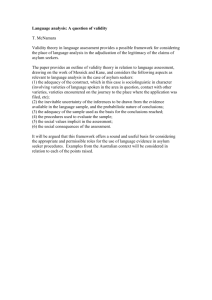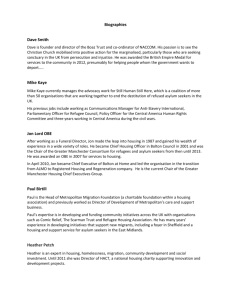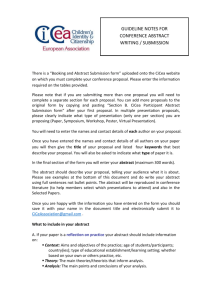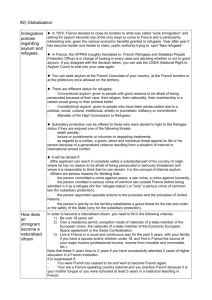In force Legal act and subject matter since / date of
advertisement
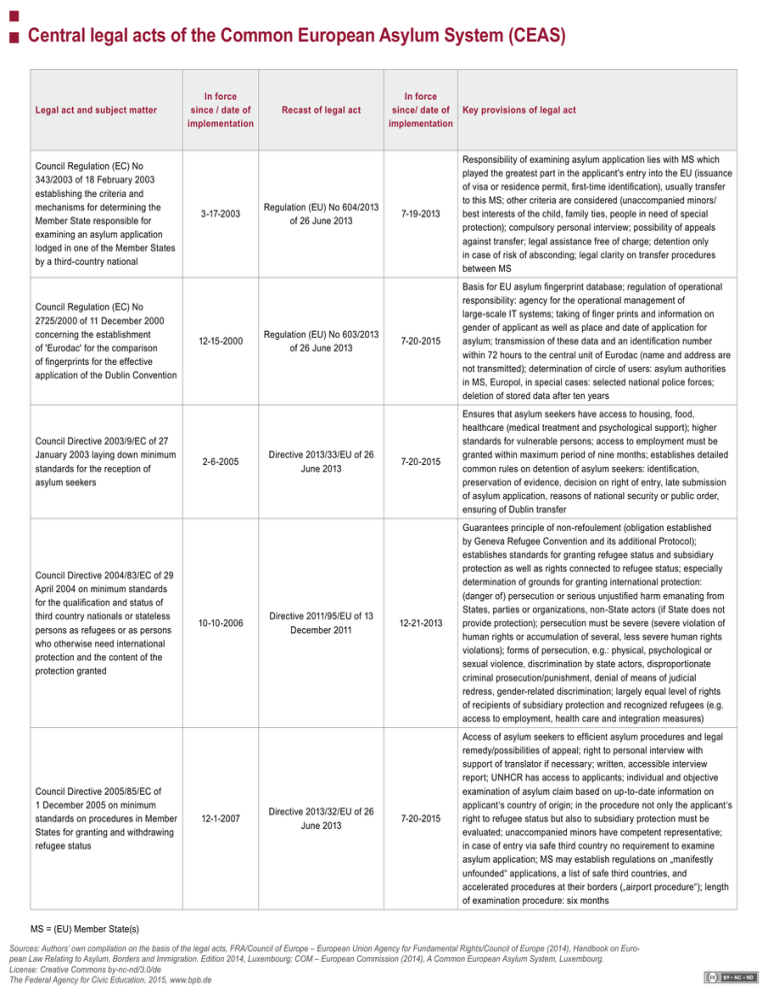
Central legal acts of the Common European Asylum System (CEAS) Legal act and subject matter Council Regulation (EC) No 343/2003 of 18 February 2003 establishing the criteria and mechanisms for determining the Member State responsible for examining an asylum application lodged in one of the Member States by a third-country national Council Regulation (EC) No 2725/2000 of 11 December 2000 concerning the establishment of 'Eurodac' for the comparison of fingerprints for the effective application of the Dublin Convention Council Directive 2003/9/EC of 27 January 2003 laying down minimum standards for the reception of asylum seekers Council Directive 2004/83/EC of 29 April 2004 on minimum standards for the qualification and status of third country nationals or stateless persons as refugees or as persons who otherwise need international protection and the content of the protection granted Council Directive 2005/85/EC of 1 December 2005 on minimum standards on procedures in Member States for granting and withdrawing refugee status In force since / date of implementation 3-17-2003 12-15-2000 2-6-2005 10-10-2006 12-1-2007 Recast of legal act Regulation (EU) No 604/2013 of 26 June 2013 Regulation (EU) No 603/2013 of 26 June 2013 Directive 2013/33/EU of 26 June 2013 Directive 2011/95/EU of 13 December 2011 Directive 2013/32/EU of 26 June 2013 In force since/ date of implementation Key provisions of legal act 7-19-2013 Responsibility of examining asylum application lies with MS which played the greatest part in the applicant's entry into the EU (issuance of visa or residence permit, first-time identification), usually transfer to this MS; other criteria are considered (unaccompanied minors/ best interests of the child, family ties, people in need of special protection); compulsory personal interview; possibility of appeals against transfer; legal assistance free of charge; detention only in case of risk of absconding; legal clarity on transfer procedures between MS 7-20-2015 Basis for EU asylum fingerprint database; regulation of operational responsibility: agency for the operational management of large-scale IT systems; taking of finger prints and information on gender of applicant as well as place and date of application for asylum; transmission of these data and an identification number within 72 hours to the central unit of Eurodac (name and address are not transmitted); determination of circle of users: asylum authorities in MS, Europol, in special cases: selected national police forces; deletion of stored data after ten years 7-20-2015 Ensures that asylum seekers have access to housing, food, healthcare (medical treatment and psychological support); higher standards for vulnerable persons; access to employment must be granted within maximum period of nine months; establishes detailed common rules on detention of asylum seekers: identification, preservation of evidence, decision on right of entry, late submission of asylum application, reasons of national security or public order, ensuring of Dublin transfer 12-21-2013 Guarantees principle of non-refoulement (obligation established by Geneva Refugee Convention and its additional Protocol); establishes standards for granting refugee status and subsidiary protection as well as rights connected to refugee status; especially determination of grounds for granting international protection: (danger of) persecution or serious unjustified harm emanating from States, parties or organizations, non-State actors (if State does not provide protection); persecution must be severe (severe violation of human rights or accumulation of several, less severe human rights violations); forms of persecution, e.g.: physical, psychological or sexual violence, discrimination by state actors, disproportionate criminal prosecution/punishment, denial of means of judicial redress, gender-related discrimination; largely equal level of rights of recipients of subsidiary protection and recognized refugees (e.g. access to employment, health care and integration measures) 7-20-2015 Access of asylum seekers to efficient asylum procedures and legal remedy/possibilities of appeal; right to personal interview with support of translator if necessary; written, accessible interview report; UNHCR has access to applicants; individual and objective examination of asylum claim based on up-to-date information on applicant‘s country of origin; in the procedure not only the applicant‘s right to refugee status but also to subsidiary protection must be evaluated; unaccompanied minors have competent representative; in case of entry via safe third country no requirement to examine asylum application; MS may establish regulations on „manifestly unfounded“ applications, a list of safe third countries, and accelerated procedures at their borders („airport procedure“); length of examination procedure: six months MS = (EU) Member State(s) Sources: Authors’ own compilation on the basis of the legal acts, FRA/Council of Europe – European Union Agency for Fundamental Rights/Council of Europe (2014), Handbook on European Law Relating to Asylum, Borders and Immigration. Edition 2014, Luxembourg; COM – European Commission (2014), A Common European Asylum System, Luxembourg. License: Creative Commons by-nc-nd/3.0/de The Federal Agency for Civic Education, 2015, www.bpb.de
